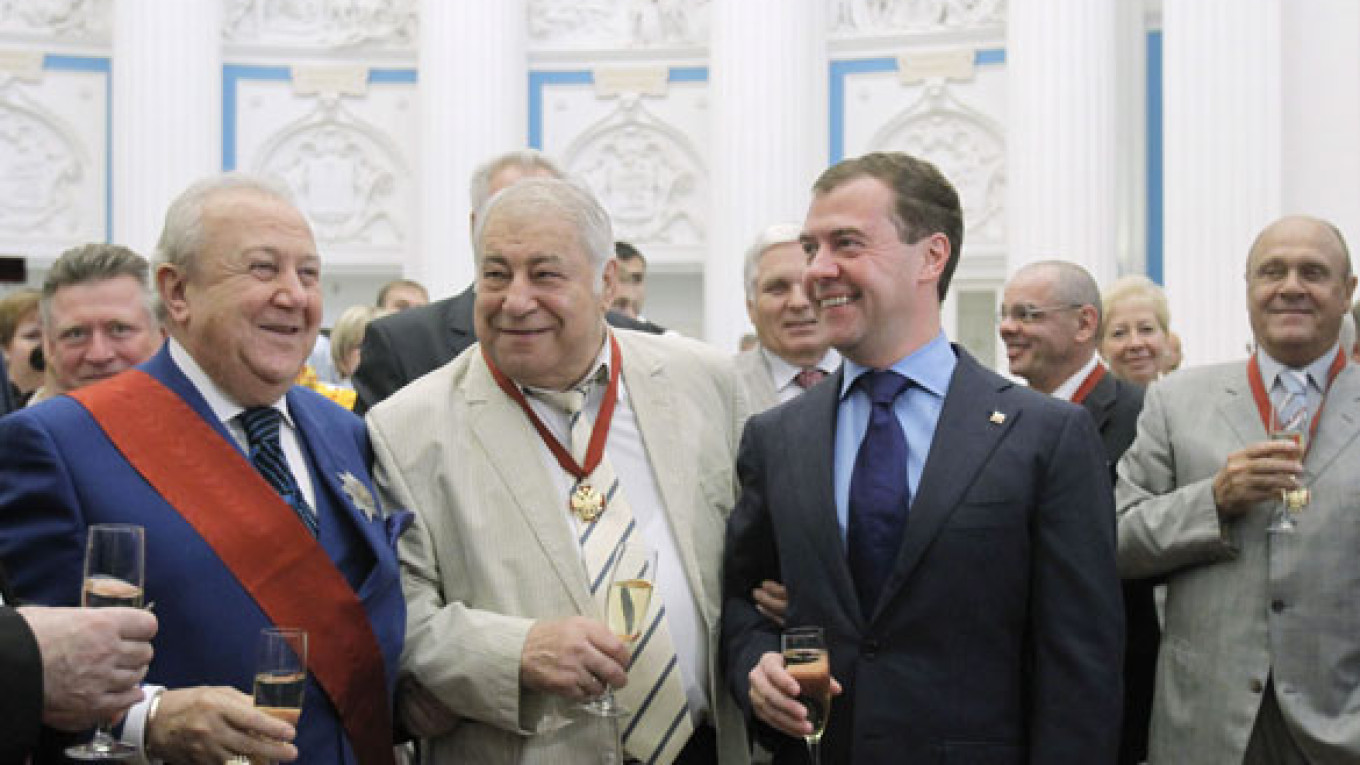President Dmitry Medvedev has ordered Prosecutor General Yury Chaika to investigate possible Kremlin corruption linked to the 2014 Sochi Olympics —? and issued the handwritten order on a copy of the opposition-minded newspaper Novaya Gazeta.
Novaya Gazeta on Wednesday published a photograph of Medvedev's order, dated July 20 and written on an Internet copy of a story that the newspaper previously printed about the corruption claims.
In the order, Medvedev told Chaika to investigate corruption allegations against Kremlin official Vladimir Leshchevsky at the request of businessman Valery Morozov, who has accused Leshchevsky of extorting bribes in connection with construction for the Winter Olympics.
Moskonversprom chairman Morozov told Russian and British media in early June that he had paid 180 million rubles ($5.7 million) in kickbacks to Leshchevsky, a deputy head of construction in the Office of Presidential Affairs, for winning a tender to reconstruct the Primorye complex at a sanatorium called Sochi and to draft a reconstruction plan for the Dagomys sanatorium. Both sanatoriums are affiliated with the Office of Presidential Affairs.
Leshchevsky has called the accusations unfounded and said Morozov was looking to avoid repercussions for violating the terms of his contract.
A spokesman for the Prosecutor General's Office said Wednesday that there would be no comment on Medvedev's order "until there are results" in the check into Leshchevsky's activities. He could not say whether the check was under way but added, "It has to be."
Leshchevsky was on vacation and unavailable for comment, said Viktor Khrekov, a spokesman for the Office of Presidential Affairs. He added that Leshchevsky, who has been on vacation for the past week, remained in his post in good standing.
Morozov applauded Medvedev's order and said it "may become the decisive moment" in his firm's battle with Kremlin officials.
"This has to nudge the consciences of the officials who are torturing us," Morozov said by telephone.
In ordering the investigation, Medvedev is seeking to fulfill a promise made soon after he assumed office "to reinforce the role of the media in the fight against corruption," said Kirill Kabanov, head of the National Anti-Corruption Committee, a nongovernmental organization.
But Kabanov said Kremlin officials, not including Medvedev, have formed "a well-organized system that can protect itself and prepare run-around replies to the president and the prime minister, deluding them."
Alexei Makarkin, an analyst with the Center of Political Technologies, said the president sought to show that he respected the media and opposition voices while underlining his desire to fight corruption "without double standards."
Novaya Gazeta deputy editor Sergei Sokolov said Medvedev was "sick that his orders are not fulfilled." Medvedev selected Novaya Gazeta for his first interview to a Russian newspaper as president.
Moskonversprom first complained about Leshchevsky in June 2009 to the Interior Ministry's economic crimes department, which recorded Leshchevsky receiving a bribe from the firm and handed the recording over to the Investigative Committee, which said it saw no crime in Leshchevsky's actions, Moskonversprom general director Irina Morozova said in late January in the first of three complaints to Medvedev, a copy of which is posted on Moskonversprom.ru.
In reply to Morozova's January letter, Medvedev ordered Chaika to investigate Leshchevsky, but prosecutors brought no charges against Leshchevsky despite confirming the corruption allegations, Morozova said in her second letter to Medvedev in May.
The second letter went unanswered, and Moskonversprom published an open letter to the president in early June, seeking disciplinary action against Leshchevsky and his colleague Sergei Smirnov for continuing to "put economic pressure" on the firm.
In March, construction workers at a Moskonversprom project in Sochi told The Moscow Times that they had not been paid in months and were forced to pawn their belongings for food. Morozov denied the allegations at the time, saying the strikers were part of a campaign to discredit his firm for the sake of local construction companies.
Moskonversprom had also been building housing for Sochi residents relocated because of the construction for the Olympics, before state corporation Olimpstroi said it broke off the contract with the firm in early June over Moskonversprom's "failure to abide by the contract terms, such as labor conditions."
Moskonversprom has worked with the Office of Presidential Affairs since 2003, Morozova said in one of her three letters to Medvedev.
Further complicating matters, two unidentified Sochi police officers on Monday beat up one of Moskonversprom's directors, Andrei Shurpyak, and forced him to sign documents that said a developer, Sochiremstroi, had carried out construction on a residential complex for displaced Sochi residents, while the work in question had not been done, Morozov said in an e-mailed statement.
Morozov said the incident was part of an attempt by the police to open a criminal case against Moskonversprom on orders from unidentified senior officials.
A Sochi police spokesman said he could not immediately confirm Morozov's account.
Repeated calls to Sochiremstroi's office went unanswered Wednesday.
A Message from The Moscow Times:
Dear readers,
We are facing unprecedented challenges. Russia's Prosecutor General's Office has designated The Moscow Times as an "undesirable" organization, criminalizing our work and putting our staff at risk of prosecution. This follows our earlier unjust labeling as a "foreign agent."
These actions are direct attempts to silence independent journalism in Russia. The authorities claim our work "discredits the decisions of the Russian leadership." We see things differently: we strive to provide accurate, unbiased reporting on Russia.
We, the journalists of The Moscow Times, refuse to be silenced. But to continue our work, we need your help.
Your support, no matter how small, makes a world of difference. If you can, please support us monthly starting from just $2. It's quick to set up, and every contribution makes a significant impact.
By supporting The Moscow Times, you're defending open, independent journalism in the face of repression. Thank you for standing with us.
Remind me later.


